|
|
|
Sort Order |
|
|
|
Items / Page
|
|
|
|
|
|
|
| Srl | Item |
| 1 |
ID:
141480
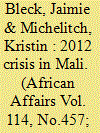

|
|
|
|
|
| Summary/Abstract |
In 2012 Mali faced a crisis disrupting nearly twenty years of democratization – a coup and rebel insurgency. This article investigates policy priorities amongst rural Malians living on the border of state and rebel-controlled territory during the crisis. While academic and policy-making communities have focused largely on Mali's recent and sudden regime and territorial breakdown, the villagers defined the crisis in terms of their unmet needs for public services and infrastructure amidst high food and water insecurity. Concern for the sudden ‘juridical state’ breakdown – the collapse of the democratic regime – was trumped by the focus on long-term ‘empirical state’ breakdown. Using recent Afrobarometer data on diverse dimensions of empirical statehood, we show that the problem of rural neglect emphasized by seminal scholars is persistent not only across Mali, but also across many African countries. The tendency of academics and policy makers to focus on the immediate or more volatile political problems of the coup and rebel insurgency facing the Malian state, while important, risks understating and underestimating the power of slow-moving crises of daily life that are more important to rural citizens.
|
|
|
|
|
|
|
|
|
|
|
|
|
|
|
|
| 2 |
ID:
145124
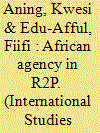

|
|
|
|
|
| Summary/Abstract |
Both the African Union (AU) and the Economic Community of West African States (ECOWAS) have been global leaders in embracing and operationalizing responsibility to protect (R2P). The adoption of the AU’s Constitutive Act, Article 4 (h) in 2000, has transformed its old-fashioned principle of noninterference to one of nonindifference. This authorizes the AU to intervene in Member States with respect to war crimes, genocide, ethnic cleansing, and crimes against humanity. ECOWAS has through its conflict prevention, management, and resolution protocol and its conflict prevention framework deepened and practicalized the notion of sovereignty as responsibility. These frameworks from both the AU and the ECOWAS have close similarities to the R2P norms. However, although these notions are captured in official documents, their actual operationalization faces challenges relating to sovereignty, limited institutional capacity, a restricted appetite for enforcement action, and a lack of explicit instruments to activate their intervention clauses in R2P-like situations. In spite of these challenges, the article argues that the initiatives of both the AU and the ECOWAS in Mali, Cote d’Ivoire, and Libya demonstrated a positively active African agency in contributing to global peace processes. This article, therefore, assesses the successes and limitations of African regional agency in enforcing R2P-like norms among its member states and its implications for and contributions to global international relations discourses.
|
|
|
|
|
|
|
|
|
|
|
|
|
|
|
|
| 3 |
ID:
191041
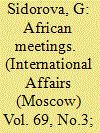

|
|
|
|
|
| Summary/Abstract |
THE myth of the indestructibile primacy of Western countries - former metropolises in world affairs, including on the African continent - is crumbling day by day, proving its groundlessness. The colossus's feet turned out to be clay, unable to stand the test of time. Today, the West is at a loss over Russia's practical steps to strengthen friendly relations with the states of Africa and the East in the name of international security and cooperation for the benefit of all peoples.1.
|
|
|
|
|
|
|
|
|
|
|
|
|
|
|
|
| 4 |
ID:
123792
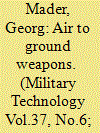

|
|
|
|
|
| Publication |
2013.
|
| Summary/Abstract |
The range of potentially looming or very real threats is broad, as are the assets already used today, be it, Iran's underground nuclear enrichment sites or Islamist irregulars in Toyotas. This survey is a stroll through recent selected developments in modern air to ground weapons (ATGW) countering these threats.
|
|
|
|
|
|
|
|
|
|
|
|
|
|
|
|
| 5 |
ID:
123671
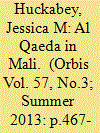

|
|
|
|
|
| Publication |
2013.
|
| Summary/Abstract |
The control of northern Mali in 2012 by Tuareg rebels and Islamist fighters aligned with al Qaeda proved a serious challenge to Western counterterrorism policies. This article looks at several aspects often overlooked in discussions of the internal dynamics of al Qaeda-linked groups. Using defections related to the al Qaeda in the Islamic Maghreb (AQIM) offshoot group, the Movement for Unity and Jihad in West Africa (MUJAO), in Mali as a case study, this article considers the issues of race and legitimacy connected to the group and the threat and policy implications that flow from this analysis.
|
|
|
|
|
|
|
|
|
|
|
|
|
|
|
|
| 6 |
ID:
147721
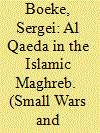

|
|
|
|
|
| Summary/Abstract |
After incurring significant losses during France’s 2013 Operation Serval in Mali, Al Qaeda in the Islamic Maghreb (AQIM) is back. Mokhtar Belmokhtar has rejoined the group, violent attacks are on the increase, and southern Libya offers elements of the group a new safe-haven. This article takes a long view on AQIM, looking at its objectives and ideology, organizational structure, relationship with the local population and revenue model to determine whether they should be labelled as terrorists, insurgents, or ordinary criminals. The article concludes that AQIM generally follows a strategy of terrorism, while some elements and modus operandi could also be indicative of a strategy of insurgency. AQIM’s primary commanders have a long-standing relationship with the global Al Qaeda movement, are unlikely to be seduced by the Islamic State, and enjoy significant autonomy in conducting their operations. There is, however, little evidence that supports the view that AQIM is a criminal organization behind a religious façade, and its Salafi–jihadist ideology remains a leading determinant.
|
|
|
|
|
|
|
|
|
|
|
|
|
|
|
|
| 7 |
ID:
125567
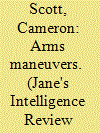

|
|
|
|
|
| Publication |
2013.
|
| Summary/Abstract |
The overthrow of Libyan leader Muammar Ghadaffi in 2011 prompted a flood of weapons into north Africa and the Middle East. Cameron Scott investigates the rise of illicit arms trafficking and its effects on regional stability.
|
|
|
|
|
|
|
|
|
|
|
|
|
|
|
|
| 8 |
ID:
097677
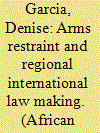

|
|
|
|
|
| Publication |
2009.
|
| Summary/Abstract |
This article analyses the political evolution and legal structure of the Economic
Community of Western African States (ECOWAS) Convention on Small Arms and
Light Weapons, Their Ammunition and Other Related Material, adopted in 2006,
within the broader context of the small arms debate at the regional (initiatives by Mali)
and international levels, principally at the United Nations. The ECOWAS Convention
breaks new ground as it is based on human security, international humanitarian law,
sustainable development and human rights principles. The ECOWAS Convention is
groundbreaking in many respects. It is innovative especially vis-à-vis basing its text on
international humanitarian law, international human rights law and development needs.
In comparison with all other instruments of law on small arms, it is one of the most
evolved.
|
|
|
|
|
|
|
|
|
|
|
|
|
|
|
|
| 9 |
ID:
140414
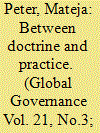

|
|
|
|
|
| Summary/Abstract |
Mandates of recent peacekeeping operations across Africa have shown substantial innovation in the thinking of the UN Security Council. Offensive use of force, use of unmanned aerial vehicles, strategic intelligence and communication, and state-building mandates in the midst of conflicts have all expanded the scope of activities beyond what the UN peacekeepers are accustomed to. The UN is entering a new era of enforcement peacekeeping. Enforcement peacekeeping manifests itself both in enforcement of political solutions through support of a government's state-building ambitions and its attempts to extend state authority in the midst of conflict and in enforcement of military victories through the offensive use of force. These developments further unsettle the basic principles of UN peacekeeping—consent, impartiality, and nonuse of force—resulting in a schism between the doctrine and practice. This contribution argues that such fundamental challenges, when not properly acknowledged, create a wall between operational activities and strategic considerations. They preclude a proper debate on the problematic externalities, in particular on political processes and peacebuilding.
|
|
|
|
|
|
|
|
|
|
|
|
|
|
|
|
| 10 |
ID:
183464
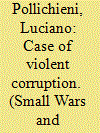

|
|
|
|
|
| Summary/Abstract |
This article provides a new perspective on the logic of violence of the JNIM in the context of the Malian civil war. After a critical review of the literature on the Malian conflict, this article will apply Benjamin Lessing’s model on the logic of violence in criminal wars to JNIM. Through the adoption of Lessing’s model, this article will demonstrate how JNIM’s insurgency can be considered as a case of violent corruption in the context of a war of constraint. Combining qualitative and quantitative methods, this paper will show firstly, how the Malian civil war should be conceived as a war of constraint rather than a war of conquest; secondly, how JNIM is using violence in order to restrict the implementation of the rule of law in some regions which are strategic also for its financing activities. By adopting this new framework, it will be possible to overcome some conundrums characterising the debate on the Malian insurgency and to highlight some relevant topics for future research.
|
|
|
|
|
|
|
|
|
|
|
|
|
|
|
|
| 11 |
ID:
168172
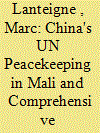

|
|
|
|
|
| Summary/Abstract |
China's increasing participation in United Nations peacekeeping operations reached a milestone in 2013 when Beijing agreed to send a large detachment of personnel, including combat forces for the first time, to support UN peacekeeping operations in Mali after that country fell into civil war. This commitment was also distinct in that unlike other African countries where Beijing has supplied peacekeepers, Mali is not a major trading partner with China. However, this mission has both cemented Beijing's greater commitment to building African partnerships as well as demonstrating its determination to move beyond “resource diplomacy” and towards a more comprehensive approach to engaging the continent. Although China has warmed to the principles of humanitarian intervention in civil conflicts, Mali has been a critical test of China's ability to participate in UN operations in a country which is still facing ongoing violence. The Mali mission is an important step in Beijing's turn towards greater realpolitik in Chinese Beijing's peacekeeping policies in keeping with its great power status. At the same time, participation in the Mali mission has been beneficial for China, not only in helping to build the country's peacekeeping credentials in Africa but also in underscoring China's increasingly distinct views on addressing intervention in civil conflicts.
|
|
|
|
|
|
|
|
|
|
|
|
|
|
|
|
| 12 |
ID:
097771
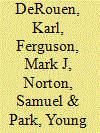

|
|
|
|
|
| Publication |
2010.
|
| Summary/Abstract |
Negotiated civil war terminations differ from their interstate war counterparts in that one side must disarm and cease to exist as a fighting entity. While termination through military victory provides a relatively more enduring peace, many civil wars end with peace agreements signed after negotiations. However, research has shown that the implementation of civil war peace agreements is difficult and prone to collapse. Often these failures are followed by recurrence of the conflict. In some cases, the agreements break down before key provisions are implemented. This article adds to this topic by focusing on the role of state capacity in peace agreement success. We argue that peace agreements and state capacity are necessary but not sufficient conditions for sustainable peace. The article employs a case study approach to explore the importance of state capacity in implementing civil war peace agreements. The role of third-party interventions is also considered. The cases (United Kingdom-Northern Ireland, Indonesia-Aceh, Burundi, Mali, and Somalia) include 14 peace agreements that vary by war type (secessionist or control over government), type of agreement (comprehensive or partial), levels of state capacity (high or low), and peace success (success, partial or failure), and each experienced third-party involvement in the peace process.
|
|
|
|
|
|
|
|
|
|
|
|
|
|
|
|
| 13 |
ID:
133614
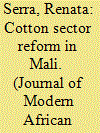

|
|
|
|
|
| Publication |
2014.
|
| Summary/Abstract |
This paper provides a detailed analysis of the cotton sector reform process in Mali from 2000 to 2011, explaining reform delays and ambiguities in terms of the wider political and socio-economic context and aid relationships. Contrary to arguments pointing to lack of state commitment and ownership, domestic stakeholders increasingly worked towards finding an acceptable and consensual reform package. The process encountered quite serious obstacles, however, due to divergent actors' incentives, and the existence of opposing philosophies about what a restructured cotton sector should look like. As a consequence of donors' misjudgement of the political and social realities underlying the Malian cotton sector, dialogue among stakeholders was difficult and polarised, forcing the government to spend considerable time and resources to find a suitable compromise. This paper contributes to a better understanding of the merits and limits of pursuing consensual policy processes against the constraints posed by divergent donors' policy paradigms.
|
|
|
|
|
|
|
|
|
|
|
|
|
|
|
|
| 14 |
ID:
129191
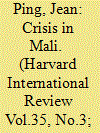

|
|
|
|
|
| Publication |
2014.
|
| Summary/Abstract |
In order to better understand what happened in Mali in 2012 and to seek appropriate solutions to the major obstacles facing this country, it is necessary to recall the nature and causes of the numerous challenges confronting the nation. these vital concerns relate to ethnicity, secession, terrorism, coups, governance, poverty, corruption, drought and climate change. These factors affect not only Mali but also represent obstacles faced by a multitude of other countries on the continent. However, in the case of Mali, these issues were all brought together in the same place and brutally erupted at the same time during the course of the year 2012, provoking disintegration and the subsequent French military intervention.
|
|
|
|
|
|
|
|
|
|
|
|
|
|
|
|
| 15 |
ID:
099280
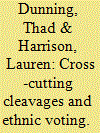

|
|
|
| 16 |
ID:
159367
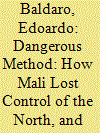

|
|
|
|
|
| Summary/Abstract |
This article analyses changes and failures in the northern Mali system of security governance, taking into account the period running from the declaration of the Malian Third Republic (1992) to the present. Considering northern Mali as an area of limited statehood, the article develops a comparative diachronic analysis, distinguishing between three phases, namely Militiarisation (1992–2002), Fragmentation (2002–2012) and Multiplication (2013–ongoing). For every phase the focus is on (1) the mechanisms of coordination among actors, (2) the distribution of coercive capacities and ruling power and (3) the forms of authority. Unintended consequences and collective problems are highlighted, in order to understand the current situation of insecurity in the area.
|
|
|
|
|
|
|
|
|
|
|
|
|
|
|
|
| 17 |
ID:
119440
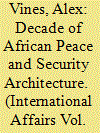

|
|
|
|
|
| Publication |
2013.
|
| Summary/Abstract |
This article examines how the African Union (AU) has handled Africa's peace and security challenges since 2002, defines what has been successful and what remains aspirational. It does so by examining how the AU has responded, from using sanctions against coups, to deploying peacekeeping missions and mediating in conflicts.
An African Peace and Security Architecture (APSA) has developed since 2002, including a Peace and Security Council, an African Standby Force, a Continental Early Warning System and a Panel of the Wise. This sounds impressive, but the operationalization record is patchy: AU-deployed missions have been fully dependent on external donors; harmonization is a major problem; serious questions remain over AU capacity; and some of the Regional Economic Communities (RECs) are developing at a quicker pace than the AU.
Given these circumstances and its internal capacity deficit, the AU will likely struggle to exercise oversight of regional processes, including the development of regional standby force arrangements. APSA is clearly based on a liberal peace model, yet democratic systems, respect for human rights and good governance aren't always in place in African countries, and the self-interest of elites continues to be a constraint on APSA and its success.
Over the last decade the AU has found a voice and, despite some setbacks, it has shown through AMISOM in Somalia that it is capable of conducting a successful peacemaking operation. Its biggest challenge is not making the decision to intervene or deploy forces, but the capacity of most African states to deploy effectively. APSA's dependence on external partners needs to diminish over the next decade if better African solutions are to be found to peace and security challenges in the continent. Yet, the internationalized nature of crises such as the one in Mali in 2012-13 requires international partnerships.
Not all of Africa's security problems can be solved by Africa alone, but APSA does provide a vision framework for African and external partnership.
|
|
|
|
|
|
|
|
|
|
|
|
|
|
|
|
| 18 |
ID:
124759
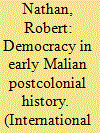

|
|
|
|
|
| Publication |
2013.
|
| Summary/Abstract |
The level of public support for the March 2012 military coup d'état in Mali surprised many observers who viewed the country as a viable democracy and believed its inhabitants perceived it in the same light. This article suggests that, despite this favourable appraisal by certain outsiders, many Malians had low levels of confidence in the democracy of President Amadou Toumani Touré, considering it corrupt and dysfunctional. In light of such attitudes in the present, this article turns toward the past to draw lessons from Mali's history of démocratie de façade. It examines Mali's earliest engagement with democracy in the late colonial era, and the manner in which democratic political discourse was abused by Mali's first postcolonial government. It suggests that Malian leaders' long history of invoking democratic principles for non-democratic aims may have weakened the legitimacy of the government following the 2012 coup d'état, and could make the reestablishment of confidence in Mali's democracy a more challenging task than simply organizing new multi-party elections.
|
|
|
|
|
|
|
|
|
|
|
|
|
|
|
|
| 19 |
ID:
107903
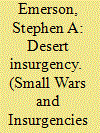

|
|
|
|
|
| Publication |
2011.
|
| Summary/Abstract |
This article provides an in-depth examination and analysis of the 2006-2009 Tuareg rebellion in Mali and Niger. It identifies the underlying reasons behind the rebellion, explores contrasting counter-insurgency (COIN) strategies employed by the two governments, and presents some lessons learned. While both COIN approaches ultimately produced similar peace settlements, the article argues that the Malian strategy of reconciliation combined with the selective use of force was far more effective than the Nigerien iron fist approach at limiting the size and scope of the insurgency and producing a more sustainable peace. It concludes by looking at the role of external actors, particularly the United States, and how the failure to internationalize the conflict was actually more beneficial to the local COIN effort, as well as to the longer strategic interests of the United States in the region.
|
|
|
|
|
|
|
|
|
|
|
|
|
|
|
|
| 20 |
ID:
111811
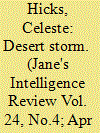

|
|
|
|
|
|
|
|